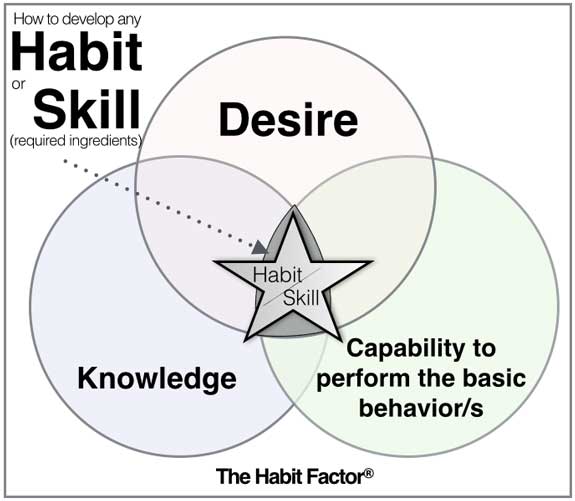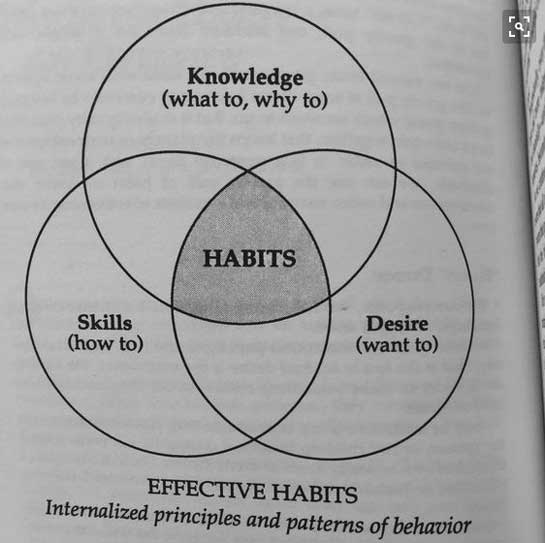
By: Martin Grunburg
There is little debate among psychologists (those who study behavioral psychology) that the relationship between habit and skill is a challenge to delineate, and their differences are difficult and hard to define.
A recent example of this comes via an article in Forbes written by Pat Brans where he asks noted Ph.D. and behavior researcher Anne Graybiel to help him understand the difference:
Brans: Are the things I’ve listed as good and bad habits truly habits in the same way breathing or eating — or even learning to ride a bicycle — are habits? In other words, are all these things supported by similar brain functions?
Graybiel: It’s hard to come up with an adequate definition of habit — and it’s even harder to make the difference between habits and skills. Let’s say it takes you months to learn a difficult piano piece by Bach. Then you stop playing it for several years. When you come back to it, you’ll re-learn it in a fraction of the original time.
(Link to full article and interview below.)
____________________________________________________
The key is that even a noted scholar is reaffirming exactly this: The difference between habit and skill, even for experts, is challenging to articulate.
Thus, we end up revisiting this:
Below is an example of an illustration I’ve shared dozens of times through the years in various workshops and lectures. However it has repeatedly and mildly bothered me, and here’s why.
Take a good look at the diagram below and notice it suggests that “SKILLS” are required to forge a habit. Given that skill and habit are nearly twin sisters — so closely related, in fact, that top scholars have a difficult time explaining their differences, then any definition/equation involving the development of “habit” most likely should not contain “skill.”
Logically, this produces a sort of circular reference that says…
To develop a habit you need a skill or skills (which is much like a habit).

Source: Dr. Stephen Covey requirements for Habit Development, The 7 Habits of Highly Effective People.
So, after much writing on the subject of habit, and teaching it now for the better part of seven years, I’ve finally made a subtle shift to Dr. Covey’s great analysis for the requirements of habit development. Instead of using the word/term “skills,” we replace it with the “capability to perform the behavior” or “capacity.” This is NOT quite as succinct, but technically much more accurate.
To be clear, though, I love this general “formula”!
Knowledge and desire are MUSTS! I nearly always end any lecture or workshop by underscoring that while I/The Habit Factor can provide the requisite “knowledge” about habit development, it’s the (reader/listener/workshop participant) who must bring the “desire”!
To finalize and simplify this discussion, let’s use a couple of sample behaviors we’re looking to forge into habits.
Example Habit #1: Brushing teeth
In order to develop the habit of “brushing teeth,” I will need 1) the DESIRE, 2) the KNOWLEDGE, and 3) the capability/capacity to perform the behaviors required for the habit’s development. However, I will not necessarily need the “skills”!
Example Habit #2: Push-ups
If, for instance, I wanted to develop the “Push-up” habit, I will again need 1) The DESIRE, 2) the KNOWLEDGE — as Covey states, the “How To” — and finally, I won’t need the “skills,” for instance, how to do a perfect pushup. I will simply need the basic capability or capacity to perform a push-up. That is, bend the elbows, have the chest and triceps’ strength to push myself up, etc.
Yes, I agree, this is a very subtle shift, and admittedly I’m in the “weeds” when it comes to habit. However, it’s important to address the requirements for habit development accurately — as accurately as possible — by shifting this equation ever so slightly.
By doing so we accomplish at least two important things: First, we move “skills” from the “ingredients” circle to where it ought to be — right next to its twin sister (they are twins — just not identical twins ; ). And, two, by moving “skills” away from the ingredients, it lessens the confusion and helps people to understand the necessary ingredients for habit development.
Thoughts?
Until next week, c-ya!
~mg